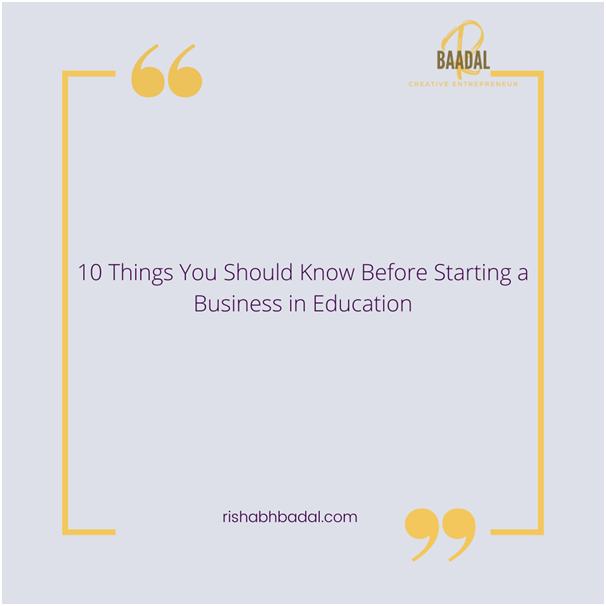The education industry is highly competitive, but it’s also lucrative if you know what you’re doing. If you’re looking to get started in this business, there are several important things you should know and consider first. This guide on how to enter the education industry will help you avoid common pitfalls and start making money sooner than later. From knowing how to find customers to making sure your product or service will be of high quality, this guide covers it all!
1) Is it realistic?
Ask yourself if your idea will realistically work before you invest too much time, money and effort into it. Ask yourself: Is my business really something that people will buy? If your answer is no, then stop! Pivot or move on to something else.
2) What will your message be?
A good first step to figuring out what business you want to start is to figure out what your message will be. What do you think is most important? What do you want people to think or feel after they hear from you? If every person heard your message, would they make a change? For example, if I wanted to start an education company, I might choose my angle as It’s never too late. So I would try to convey that message through my company name and marketing materials. That isn’t necessarily true for every education-based business idea, but it’s just one example of how knowing your angle helps narrow down decisions like where you’ll market and how.
3) Do you have unique perspective and experience?
One of the biggest mistakes new entrepreneurs make is assuming that their unique knowledge or experience translates into an easily sellable business idea. It doesn’t. If you really want to create a successful education-based business, you need to take time to research and develop an idea that resonates with your target market, then find an angle that distinguishes your company from all of its competitors. After all, it’s hard enough standing out in any industry; trying to differentiate yourself against a field full of established leaders can be next to impossible if you don’t have something special on which to hang your hat. Do you have credibility?: Credibility is king when it comes to being taken seriously as an educator—and it’s what sets apart one successful entrepreneur from another.
4) How will you find clients or customers?
If you’re launching a business, there are three basic options for finding customers: (1) building your own audience and selling to them directly, (2) selling to other businesses that serve those customers, or (3) identifying which types of customers have purchasing power and trying to sell directly to them. None of these are inherently better than another; they’re just different approaches. So think about your business idea—is it something where you can find customers easily? Or do you need help identifying them? What about serving their needs? If so, maybe that means partnering with someone who already has an audience. And if it’s not clear how people will find out about what you offer, your best bet is probably looking for more indirect ways to reach potential customers.
5) Who will run your business day-to-day?
Creating your business is one thing, but what about all of those pesky details that come up day-to-day? For example, do you want to hire someone to run your business or be an active CEO? Do you want to delegate tasks or manage everything yourself? These are important questions and will have major implications on how much (or little) time and money you need to invest to launch.
6) Can you trust family or friends to help?
It might sound great to bring on your sister, husband or best friend, but don’t make that leap too soon. They may be awesome people—they probably are!—but if you do eventually want to split from them you need to lay down ground rules now. In most cases, it’s better to hire freelancers and independent contractors instead of working with friends and family. Hiring a friend could cause tension in your relationship down the road if things don’t work out with your business, so clearly define what is expected of each person before you get started.
7) Can you see yourself doing this for years?
If you’re thinking about starting your own business, chances are it’s because you have an idea that excites you. But excitement isn’t enough. It’s important to ask yourself what you really love about your idea and if it has staying power. After all, most businesses fail or require serious pivots within five years. Make sure your business is built on something you can see yourself doing for years to come; otherwise, it may end up being more like a fun hobby than a viable profession.
8) Are you prepared for frustration, risk, and failure?
This industry is going to be frustrating, risky, and will likely fail at some point. It’s inevitable. You could be like one of those small businesses that lives off of getting people to pay their fines (and not really doing anything else), or you could do things right. One thing is for sure though: if you don’t have a passion for education and helping kids succeed, get out now. This isn’t for you. However, if it is your dream to help kids succeed in school – then by all means go for it! But be prepared for what’s ahead.
9) What happens if you fail to grow rapidly enough?
If you don’t grow rapidly enough, investors may lose interest and take their money elsewhere. Also, if your startup is unable to make it through round after round of funding or can’t raise additional rounds quickly enough as sales slow down, it can be forced to close its doors and lay off employees. Startup growth is critical because without it, your chances of failure are much higher. It’s also important to note that business financing is typically on more favorable terms when you’re growing. If you aren’t growing rapidly enough, investors may charge higher interest rates or require repayment sooner than expected; either way, securing funding for another round of investment will be more difficult.
10) Will your family support your idea?
When you’re getting started with something new, your family is going to have questions and concerns. Getting them on board will go a long way toward helping them understand what you’re doing, why you want to do it, and how they can help. said Michael Schaub, director of teacher education at Brevard College in North Carolina. He advises talking with your spouse/partner and kids before you officially announce that you are starting your own business so they are not caught off guard. Talk to them about why you’re doing it. What do they think? Is there anything that might be an obstacle for them or for others around them? Ask them what kind of support (money-wise or otherwise) they think would be helpful.



